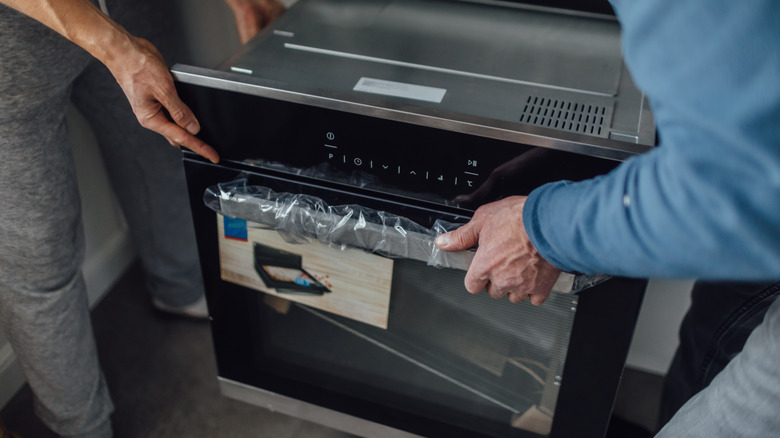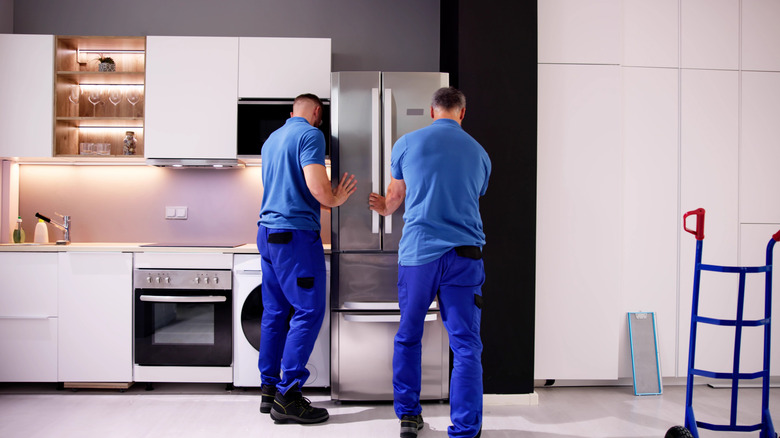The Common Mistake You'll Want To Avoid When Installing Any Appliance
Us adults look forward to things like getting new appliances. For some, the excitement of getting the new purchase up and running is just too much to resist, so they make the mistake of jumping straight to the installation without reading safety guidelines or understanding the steps. For others, going the fast DIY route offers a way to save on the cost to install appliances, but leaves little time to research the procedure. If you run your current appliance until it dies, you might be forced into a quick decision with no chance to learn how to best install the new equipment.
When you rush installation, the increased risk of errors can cost you time and money. Fitting a new appliance may seem straightforward. However, these items can be delicate and may have complex and unique setup processes. Some installations might require specialized tools that you don't own or extra parts to connect the device to power, water, plumbing, or ventilation. Failing to follow the process correctly could affect the safety and operation of the new (and often expensive) equipment. Some issues, like the appliance not working correctly, are noticeable right away. Others, like poor energy efficiency, compromised safety, or a voided warranty, don't become obvious until later.
Why rushing to install appliances causes problems
In the worst-case scenario, a rushed installation can make the appliance unsafe. Incorrectly wiring the equipment could lead to short circuits and electrical fires. For gas appliances, failing to connect the fuel line properly exposes you to the possibility of gas leaks, explosions, and fires. Gas appliances also typically require very specific ventilation, and ignoring this requirement could cause dangerous carbon monoxide buildup in your home. Note that in some jurisdictions, you may need to get a permit before installing a new electric or gas appliances. In most states, only certified technicians can install equipment that runs on gas.
Less serious but still frustrating is the impact of a rushed installation on how the appliance operates. Failing to level the appliance could impact its efficiency. Some devices, like refrigerators, have to work harder if they aren't level. That extra strain on their compressors increases energy consumption and often shortens their lifespan. Poor setup could also damage the nearby floors and walls. Mistakes you make when installing a dishwasher could cause the appliance to tilt, leak, and damage your flooring, for example. Meanwhile, an uneven oven might increase the chance of spills and leave you with poorly cooked food.
Finally, mistakes made while rushing through appliance installation could void the manufacturer's warranty. If this happens, repairs that would normally be covered will become your responsibility. Unauthorized modifications also void most appliance warranties. This means that if you somehow modify the device while setting it up, you'll also lose warranty coverage.
In a rush? Opt for professional installation
Appliance installation costs typically run between $120 and $300, with an average price of $200. To save money, you might be tempted to DIY the installation yourself. However, paying the $200 could be worth it if you want the new device up and running as quickly as possible.
Professionals know how to complete each step of the process without stopping to research it. That means they can get the job done quickly without disrupting your day for long. They have the right tools on hand and know how to use them, which helps the job go faster. Experienced installers have already run into almost every unexpected problem you can imagine, so — unlike your average DIYer — they know how to respond when issues pop up.
Paying for professional installation could save you money in the long term. You avoid potentially pricey mistakes that could damage your appliance and leave you on the hook for repairs if the DIY installation also voids your warranty. Since some appliances need professional installation to satisfy the warranty requirements, hiring a pro helps you keep that coverage intact. Crucially, professional installation won't sacrifice safety and efficiency for the sake of speed.


